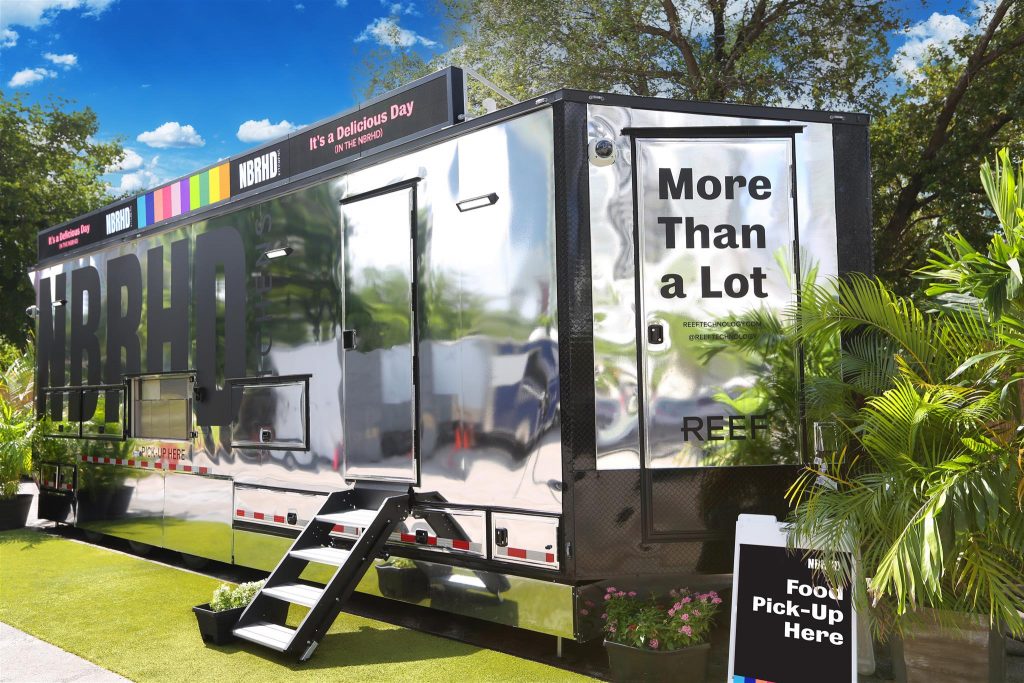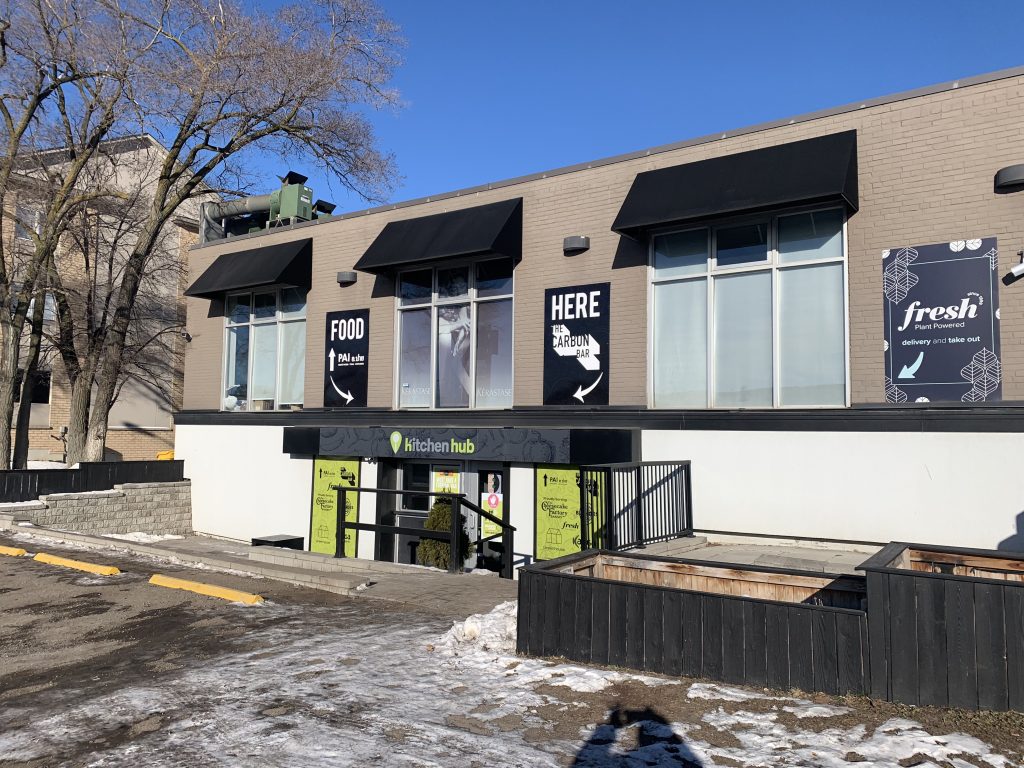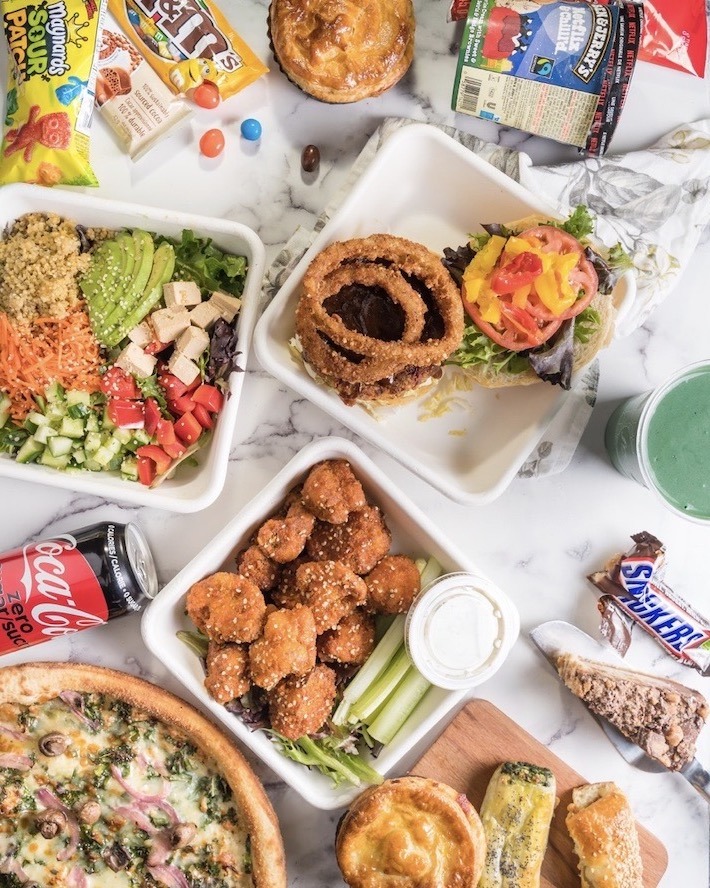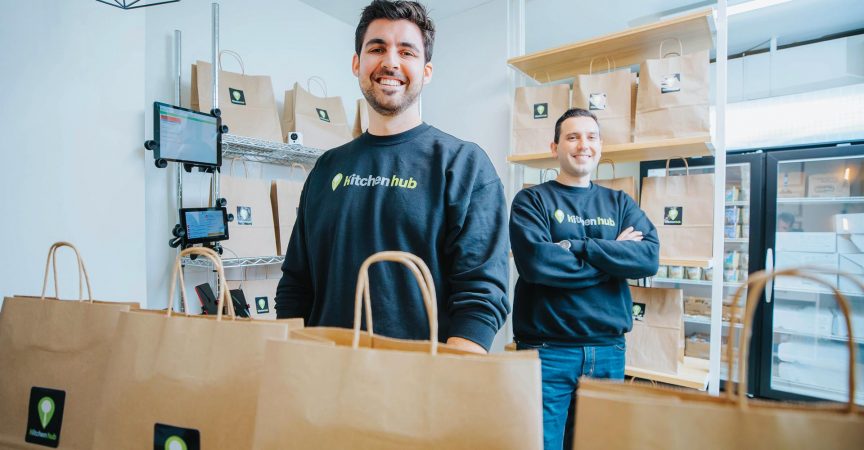The Evolution of the Ghost Kitchen
The ghost kitchen concept has been around for a long time, creeping around the periphery of the food scene for years. Early prototypes were primarily focused on the simplicity and margin potential of virtual restaurant brands with low overhead, low rents, and scalable labour model. It made for an attractive, comparatively safe investment that was favoured by start-up types chasing fast returns with delivery-only service. It seemed a no-brainer: if waffles don’t work, maybe we’ll try tacos…?
Like many disruptive ideas, ghost kitchens needed a catalyst to catch fire and hurtle the model into adolescence. In this case, it was the shared experience of staring blankly into our home pantries to see if any of the rag-tag ingredients leftover from our last ‘big shop’ wanted to work out their differences and hang out on a plate together. The all-virtual delivery joint truly came of age when we slammed our collective fridges shut and picked up the phone to order in, eating our battered emotions in-home bubbles.
Ghost kitchens, of course, are a kind of blank slate. Here, restaurant brands are virtual, simplified to a delivery app blurb, logo, and the quality of the food that arrives at the door. There’s no human connection or environmental experience required or expected here – that’s not the point.
While many restaurant operators have either explored the ghost kitchen opportunity or been forced into it headlong, there’s no question the model is not only gaining traction, but rapidly evolving beyond the original back-alley grill-to-courier model.
The evolution beyond the early prototypes really centres around a few big ideas. The first is mobility, from both a location and brand perspective. If you haven’t sunk all your hopes, dreams, and start-up money in a brick-and-mortar build-out, experiential brand, menu development, and marketing, you may have the latitude to make a few extra pivots along the way to getting it right.
Mobility grants operators the opportunity to test the viability of a location and adapt to the needs of the community around it. It’s essentially a
built-in market research opportunity that leaves operators less exposed to the real-world challenges of real estate availability and competition. The second big idea is really about scale. If the cost of entry is lower, it is also easier to replicate a virtual brand and grow to a multi-unit business.
REEF’s Neighborhood Kitchens leverage the power of proximity… from a parking lot
The combination of mobility and scale are further advanced by REEF Technology, a parking lot management company with the vision of transforming unloved parking lot spaces into profitable Neighbourhood Hubs, where carefully curated goods, services, and experiences are brought in to optimize parking lot properties once perceived as a sort of ‘necessary evil’ with a singular purpose. If their successful $700M capital raise in November 2020 and meteoric growth are any indication, their strategy has clearly caught on.

Carl Segal, COO, shares the REEF Technology vision, “The idea began with a story around the parking business and our founders’ quest to use technology to improve the parking situation – how people access and engage with parking spaces. They are amazing, underutilized spaces with proximity to where people live and meet. He imagined them as neighbourhood hubs. For us, it’s about thinking of the parking lot as a new urban hub that can bring goods and experiences to consumers where they live and where they need them most.”
The REEF Technology team launched REEF Kitchens in 2019, starting with their own restaurant brands, to learn the business, the neighbourhoods that housed their properties, and how they could reduce complexity and deliver proximity for independent brands. With about 5,000 parking garages and parking lots in their management portfolio, the company has an incredible distributed real estate network across the U.S. and Canada.
“For us, it’s about thinking of the parking lot as a new urban hub that can bring goods and experiences to consumers where they live and where they need them most.”
Carl Segal, REEF Technology
“We’re able to get brands up and running,” says Segal. “In markets where there’s a cuisine gap, we’ll fill in with our own brands until we find a suitable independent partner.” The REEF Kitchens team has not only ‘reduced’ complexity, they’ve eliminated it. REEF Kitchens not only provides the kitchen vessels and real estate but actually operates the restaurants they house on behalf of brands. The model allows them to easily trial cuisines and brands in their markets, making rapid and effective performance and insight-driven location changes as necessary.
Perhaps most remarkably, the company is not a landlord, but a kind of partner-licensee working with independent brands under a revenue-sharing agreement with a shared P&L. Segal believes it’s an ideal opportunity for entrepreneurs and regional brands hoping to expand. “We have an amazing business intelligence team that has created not only a mapping system, but true business intelligence on what types of cuisines are being ordered and where. This tool helps brands predict and make informed decisions about where brands need to be. We have also created this connection for restaurants who had to close and have helped bring many of them back to life on our platform.”
With over 100 Neighborhood Kitchens in place in 22 major urban areas across North America, Segal says the company has plans for aggressive growth. “In Canada, we have 10 kitchen vessels in Toronto, three in Calgary and two in Edmonton. We’re opening in Ottawa soon, followed by Vancouver and possibly Montreal. We’re working with some great brands at our Canadian locations, including Via Cibo, Bangkok Buri, and Salus Fresh Foods, and we work with all four major delivery partners (UberEats, DoorDash, GrubHub, Seamless). We encourage chefs and start-ups to come to our platform. If they don’t have a brick and mortar – maybe they’re an amazing chef with a quality menu, a unique differentiator, and a great idea – there’s a really good chance we can get them up and running.”
REEF Kitchens worked with both Chef Michelle Bernstein (Michy B’s) and Chef Michael Schwartz (Michael’s Greatest Hits) delivering their most sought-after favourites to lucky Fort Lauderdale neighbourhoods. They are even facilitating the deployment of celebrity-fuelled virtual food brands, like YouTube phenom MrBeast’s MrBeast Burger. The simple menu offered by an established web celebrity has been embraced by digitally native and savvy consumers with 100 operational storefronts and counting.
In Canada, Wendy’s Restaurants has embraced the Neighbourhood Kitchens concept as part of their non-traditional growth strategy, allowing them to position their brand in dense urban neighbourhoods with positive results.
Canadian brands and independents are also looking at partnering with
REEF Kitchens to help them enter into new geographies, including the U.S.
market with less risk and complexity. “We’re helping brands reconnect.” says Segal. It’s been a bit of a rollercoaster. Pre-pandemic, we were still talking about helping food entrepreneurs expand, and it was mostly independents.
Larger companies took more of a ‘wait and see’ approach. It was somewhat lukewarm. Once the pandemic hit, it changed restaurants’ relationships with their customers. It changed operators’ mindsets – particularly in larger companies. Now, it’s, “We can’t live without this.” They recognize that need to change and change now.”
FAT Brands: Using ghost kitchens to explore via delivery in high-density markets
FAT Brands, parent company of Fatburger, Buffalo’s Express, and Hurricane Grill & Wings among others has also jumped into the ghost kitchen space, opening with an experienced operator in the San Francisco market. Andy Wiederhorn, FAT Brands CEO, says it was an easy decision. “The benefit of ghost kitchens is that they allow you to seed a market where you don’t presently have brick and mortar locations and see how they perform and how customers react to them. If successful, they reveal a clear path to future brick and mortar locations. The San Francisco market has very expensive real estate and labour, so utilizing a ghost kitchen greatly lowers the risk and raises the viability of our brands in that market.”
“They allow existing franchisees to spread out in the territories they operate, meaning, if they have a location in a city and they want to grow, they don’t have to build to satisfy more customers.” – Andy Wiederhorn, FAT Brands CEO
With regular, in-person visits and a robust partnership model, the FATBrands training and operations support team ensures brand quality standards are met. “Today, we’re operating ghost kitchens within four of our brands.” says Wiederhorn, “It allows existing franchisees to spread out in the territories they operate, meaning, if they have a location in a city and they want to grow, they don’t have to build to satisfy more customers.”
The model is working so well, the company plans to explore and use ghost kitchens globally. “We’ve had ghost kitchens in Singapore for more than a year, and all over South America with the Johnny Rockets brand.” says Wiederhorn. “They’re a mechanism to support customer’s delivery needs without the need for an entire brick and mortar restaurant. Our goal is to achieve sufficient sales from ghost kitchens so that an operator is profitable, and customers can access our brands. That is the definition of success.”
Early concerns about the loss of the hospitality experience central to many restaurant brands through to move to delivery-only operations have been pushed aside due to the pandemic. The ghost kitchen model has been well received by FAT Brands customers who, Wiederhorn shares, have been exceptionally tolerant and forgiving during the pandemic. “It’s an easier time to roll out something new. People aren’t being so picky. The market is going to continue to expect extremely safe packaging (tamper-proof, etc.). Packaging that prioritizes quality throughout the delivery process will also be something customers come to expect.”
Kitchen Hub: A virtual food hall focused on quality and community
Kitchen Hub co-founder Oren Borovitch is no stranger to the food delivery business. He was one of the first employees at DoorDash Canada, steering restaurant strategy and operations for the then-fledgling delivery app.
With almost spooky timing, in January 2020, Borovitch and his co-founder, Adam Armeland, launched Kitchen Hub, Canada’s first virtual food hall, not
to be confused with a typical ghost kitchen. Kitchen Hub takes care of the logistics, operations, infrastructure, and equipment while bringing great restaurant brands together to penetrate high-demand locations and gain traction in the digital restaurant space through smart locations.

“Generally speaking, the term ‘ghost kitchen’ is quite literal—a restaurant location that is not meant to be seen but rather interacted with through digital channels like SkiptheDishes, Uber Eats, DoorDash, etc.”. says Borovitch, “Ghost Kitchens allow a restaurant to operate in a less desirable, non-retail kitchen space and generate meaningful sales through digital channels exclusively. This model can work for certain restaurants.”
“Kitchen Hub is more than a ghost kitchen, it is a collective of small,
local tastemakers and a place to experience the best a city has to offer. We go beyond just offering new locations to our partners – we actively help manage, track, and optimize our partners’ performance for online sales. The magic of our model lies in the incredible brands that we curate for each of our facilities. Together they can leverage their goodwill and provide offerings through Kitchen Hub Food Hall—allowing the consumer to order from one or many on the same order. Life’s short, order both.”
Kitchen Hub’s goal is to make Canada’s top restaurants available to everyone via high-quality takeout or delivery in just a few clicks, while offering restaurants a dedicated, turnkey kitchen space in an intelligent, shared facility.
“Our model developed as consumers were eating more of their meals via takeout and delivery, where our passion grew in an effort to assist restaurants with a platform that addresses off-premise sales through a low cost, quick and high margin solution,” says Armeland. “Outside of Kitchen Hub, we encourage and support our restaurant partners’ brick and mortar operations because we believe it is important for consumers to be able to experience the brand and establish a direct personal relationship with it. The success of a restaurant’s brick and mortar locations helps them expand their brand through digital channels on the Kitchen Hub platform.”
“The magic of our model lies in the incredible brands that we curate for each of our facilities. Together they can leverage their good will and provide offerings through Kitchen Hub Food Hall—allowing the consumer to order from one or many on the same order. Life’s short, order both.”Oren Borovitch, Kitchen Hub
Patron use of digital food delivery platforms has increased based on convenience, and more recently, necessity. Borovitch identifies “a growing shift from prime real estate at main and main to the importance of prime digital real estate on consumers phones/computers. At Kitchen Hub, we focus on the growing trend of restaurants and brands being consumed digitally while providing our restaurant partners with the tools and resources to be successful on digital channels. Consumers can interact with the restaurant the way they want to; whether it’s through kitchenhub.ca, on their favourite app, in-person, or through the phone. Restaurants are successful at Kitchen Hub because restaurants can focus on what they do best – COOK!”

Kitchen Hub is poised to powerfully integrate local with digital, creating a platform across Canada of interconnected facilities for restaurants and brands. This allows their partners to expand into a digitally-focused model with higher margins at a lower up-front investment, while increasing online presence and sales. For customers, Kitchen Hub delivers surprise and delight by enabling the freedom to order from their favourite restaurants and brands digitally, within the same delivery order, to enjoy wherever they are.
Since opening their first Kitchen Hub location in January 2020, the start-up has seen very positive results. Their restaurant brands are beating sales targets, achieving profit margins and a return on investment in excess of what they typically see in their traditional brick and mortar locations. Kitchen Hub is expanding into new locations in the GTA, including a Kitchen Hub in Toronto’s east end by March 2021 and a summer 2021 launch of a flagship location in Toronto’s midtown.
“Customers continue to express excitement towards Kitchen Hub because of the quality of our offerings and their ability to order from multiple brands in a single order.” While Armeland acknowledges that COVID-19 restrictions have played a role in their early success, he is confident their model will continue to grow, by delivering quality and choice in the right places. “The one feature that we look for in all brands that we partner with is that they are focused on expanding their ability to sell through e-commerce channels. Given the fast-paced and ever-changing landscape of the industry, we believe that restaurants who innovate and adapt to the new norm will win the day.”
Want to learn more about the evolution of ghost kitchens?
Check out the replay of the ‘Maturing of the Ghost Kitchen Concept’ panel from RC Show 2021. Get insights from Oren Borovitch, COO & Co-Founder, Kitchen Hub, Carl Segal, COO, Reef Technology, and Andy Wiederhorn, CEO, Fat Brands.
Replay is available until March 31, 2021 through RC ON DEMAND. Learn more here or get access with your RC Show login here.









